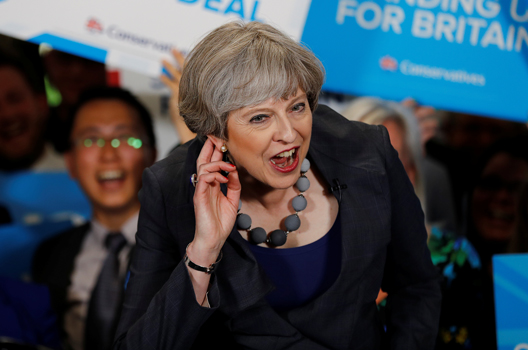 With polls showing a narrowing margin between UK Prime Minister Theresa May and Labour Party leader Jeremy Corbyn, the British general election to be held on June 8 is starting to look quite interesting. The idea that May would secure a landslide victory—one so prominent when she unexpectedly called the election five weeks ago—now seems to lie in the dim and distant past.
With polls showing a narrowing margin between UK Prime Minister Theresa May and Labour Party leader Jeremy Corbyn, the British general election to be held on June 8 is starting to look quite interesting. The idea that May would secure a landslide victory—one so prominent when she unexpectedly called the election five weeks ago—now seems to lie in the dim and distant past.
No one, bar a few Labour politicians who naturally have to make the case, is yet saying that Labour will actually win the election. However, there is the glimmer of a possibility that the election could result in a hung Parliament, with no party having an overall majority and with the United Kingdom (UK) facing the prospect of either a minority or a coalition government.
That would be a slap in the face for May and her mantra of a “strong and stable” government necessary for the upcoming negotiations on the UK’s exit from the European Union (EU), due to start just ten days after the election.
The opinion polls are revealing striking shifts in British political views. There is still no consensus on just how much the Conservative lead over Labour has shrunk, with current polls ranging from a 12 percent lead to just 3 percent. In the last election in 2015, the Conservatives—then led by former Prime Minister David Cameron, who resigned as prime minister after losing last year’s Brexit referendum—secured a twelve-seat majority in the House of Commons, winning 36.9 percent of the vote and 330 of the 650 seats, while Labour secured just 30.4 percent of the vote and 232 seats. The other votes and seats were secured by the Scottish and Welsh nationalists, the Liberal Democrats, and various other parties, notably in Northern Ireland.
This time around, Corbyn, condemned by many in his own party as an out-of-touch old-style Marxist left-winger, seems to have struck a popular chord with his attack on seven years of Conservative-led government austerity policies. He has overwhelming support among young voters—although how many will actually turn out to vote is not so clear—and he now almost ties the female vote with May, a Conservative.
What’s more, May’s strongest card, that she is the tough leader who can navigate the UK through the tricky Brexit waters of leaving the EU, may no longer be a trump card. According to the latest YouGov poll, UK voters do indeed regard Brexit as the single most important issue facing the country, with 58 percent of those questioned listing it as one of the three choices for key issues.
However, this may not play out as well for May as she hopes. Self-identified supporters of the move to exit the EU did break 60 to 25 percent in favour of the Conservatives in the same YouGov survey mentioned above, but “Remain” supporters split 53 to 24 percent in favour Labour. These numbers may reflect support for Labour’s official position on Brexit: that it accepts the outcome of the June 2016 referendum, which called for the UK to leave the EU, but that it wants to ensure tariff-free access to the European common market.
By contrast, May’s indication of what she wants has been essentially limited to repeated statements that “no deal is better than a bad deal.” No deal would mean the resumption of trade on a hideously bureaucratic tariff-based system subject to World Trade Organization (WTO) rules.
As for the Liberal Democrats, who openly stress their support for the UK remaining in the EU, they appear to have the support of just 12 percent of “Remain” backers polled—and only 2 percent of “Leave” supporters.
Despite these numbers, perhaps the biggest threat to an outright Conservative victory is buried in the heart of the detailed polling data. In last year’s referendum, British voters decided to leave the EU by a narrow margin of 51.9 percent to 48.1 percent. Right up until the week before the election, opinion polls showed general support for this position. However, on May 30 and 31, YouGov asked the key question: “In hindsight, do you think Britain was right or wrong to vote to leave the European Union?” By an admittedly tiny one-percentage-point margin, just 45 to 44 percent, the 1,875 people polled concluded that the UK was wrong to seek to leave the EU.
Now, there’s food for thought in the last week of the campaign.
John Roberts is a non-resident senior fellow at the Atlantic Council.
Image: Britain's Prime Minister Theresa May reacts as she speaks at an election campaign event at Pride Park Stadium in Derby, Britain June 1, 2017. (REUTERS/Stefan Wermuth)
